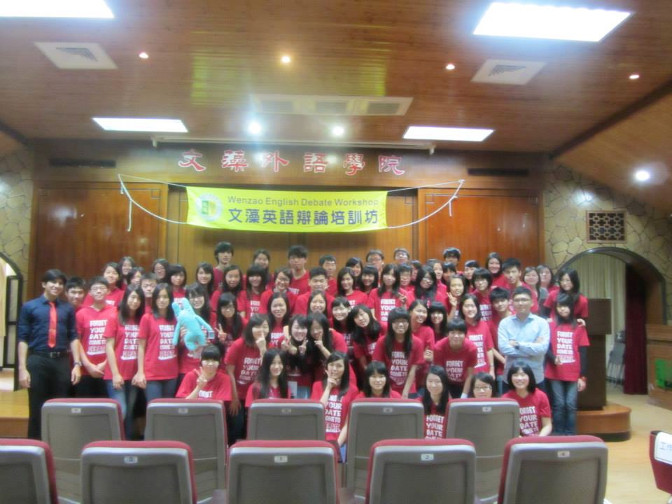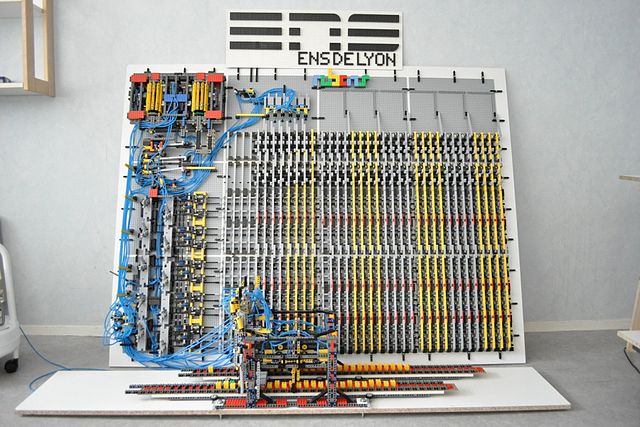
This is a biased summary of the ten days in the 8th Wenzao English debate workshop.
序
正因為去年參加文藻辯論坊時的喜悅依然清晰,所以當我聽到「第八屆文藻英語辯論培訓坊」的消息之後,馬上就有了想參加的念頭。雖然有一些讓我躊躇不前的理由:像是寒假第一周剛考完期末考就得馬上南下的困擾;這次好友都沒有參加,一個人的恐懼;以及主辦單位遇到的突發困難。可是這些都比不過對英辯的支持與期待,最後最後,我還是下定決心啟程!
場地還是在高雄的文藻外語大學,但這次長達十天。或許由於曾參加過上屆的盛事,在前六天的分班中,我被分到以練習為主體的進階班級裡,不斷進行不同形式的團體討論、上台辯論以及事後檢討。最後四天,所有學員一起連續比 8 場積分排名賽,爭取進入前 8 強,再開始單淘汰賽。而在第三天組好隊後,也在比賽之前進行了兩次練習賽,讓我們培養默契與練習技巧。
這十天有著好多好多的體會、好多好多的感動,自己也在很多方面都有所成長。能有此機會參與此一盛事真的十分開心。
亞洲議會
這次英語辯論的形式是 Asian Parliamentary (AP) format,分成兩個隊伍互相辯論,有站在正方支持 motion 的 government side,以及反對 motion 的 opposition side,每隊三人。其中正方三人依序為:
- Prime Minister (PM) - 設定整場辯論的架構,定義 motion,並開始正方的論述。
- Deputy Prime Minister (DPM) - 反擊對方的論點並重建己方的論點,並繼續剩下的論述。
- Government Whip (GW) - 整理整場辯論的重要議題並根據議題反擊對方的論點,及整理己方的立場。
反方三人依序為:
- Leader of the Opposition (LO) - 反擊正方的論點並提出自己的立場與論述。
- Deputy Leader of the Opposition (DLO) - 反擊對方的論點並支持重建己方的論點,並繼續剩下的論述。
- Opposition Whip (OW) - 整理整場辯論的重要議題並根據議題反擊對方的論點,及整理己方的立場。
每人時間為 7 分鐘。除此之外,在辯論尾聲時,雙方的前兩位辯者之一會上台進行 4 分鐘的 reply speech,總結整場辯論並分析為何評審該支持己方。
每次辯論開始時,會有三個 motions,雙方各自決定喜好順序後,再決定辯論的主題,從三個 motions 公佈到辯論開始共有 30 分鐘的準備時間。詳細介紹可參考:〈Asian Parliamentary Debate〉。
開始的故事
這次的講師是 Ray Yen 和 Syed Saddiq,據同學所說都是相當帥氣的講師。第一天早上先由 Saddiq 向全體學員講解基本規則及每個角色的責任,下午再一起到學生餐廳吃飯,有廚師們特別為我們準備的自助餐,可以吃的飽飽!下午就開始分班教學了,我們由 Ray 帶領,先從自我介紹開始,並順便提出一件自己特別在意的議題。一開始沒有想太多,到後來才知道每個人要以此為主題來練習說服別人接受自己的立場。
我們這個班的學員多半是曾參與過英辯坊或者英辯社等活動的學生,算是較有經驗,所以 Ray 也向我們招募是否有人要自願參與明天的示範辯論賽選手。就在我猶豫不決時,報名很快就額滿了,大家真的好積極。
真的要說好可惜這次的示範賽不是由講者進行,猶記得去年的示範賽是那麼精彩,以至於開始辯論時大家都會模仿講者使用的句型。但在有次練習時有人使用了去年的句子(We proudly propose this motion!)以後,我的回憶都被勾回來了,所以我也開心的使用起這些罐頭句。
第二天下午繼續分班教學。這時我們主要是分成兩大組,進行 case building,提出 Definition, Context, Stance, 3 Arguments。Ray 總是喜歡一些挑戰人既定價值的題目,像是「This house would legalize bestiality.」、「This house would legalize necrophilia.」等等,真的超級難去支持。
常常 Ray 會批評,我們的論點只是一句陳述而沒有論證理由。他總是要我們不斷的問自己 Why? Why? Why? 而不要有任何假設與成見,我們花了許多時間努力修正卻一直都還有進步空間。
漸上軌道
在 Cindy (雖然同名不過她不是我去年的隊友)的幫忙之下,我終於找好了比賽的兩個隊友(真的感謝妳!在一群大家互相認識的班中,真的好像動作太慢就找不到人了),分別是 Sophie 和 Sophia,不過其實只知道是台大和成大的同學們,因為不同班,所以一開始見面的機會不多。我們很快用三人的英文名字決定了隊名「Triple S」,真的很有效率。
第三天的分班教學,以 4 大組的方式開始互辯,每次 2 組,另外 2 組跟班學習,由於時間關係,只進行上半部兩位辯者,只是我們對 motion 的定義似乎都不夠明確,於是下午 Ray 要我們分成兩人一組,專注在 Prime Minister 的架構設定。
我和 Cindy 一起準備「This house would screen fast food commercials.」,我們實在難以想像為何有此 policy 的必要,但還是得硬想出一些理由,最後至少架構上評價不錯。
慢慢了解筆記要事先寫下要講的重點與每個論點的細節,否則腦袋突然一片空白就很難繼續了。另外也注意到在準備時就使用計時器是很重要的事,而在上台時使用計時器也對時間控制有很大幫助。最後就是,人數少討論起來真的比較有效率,之前分成兩個大組幾乎都把時間花在跟隊友互相辯論。慢慢也覺得好像開始找回之前辯論的感覺,不過還要繼續加油。
這次的功課是以同樣主題再準備一次 PM speech,但要有 3 分鐘以上長度的論點,以 Assertion、Reasoning、Examples 架構來建構論點。下課後我很用心的想好論點,但隔天才知道要改成站在 Opposition 的立場重新建構(然後我開始發現 Ray 真的很喜歡做一些出人意料的安排),沒能講出自己精心設計的論點實在讓我有點小失望。
練習賽開打
第四天下午我們要在觀看 debate 的過程中不斷進行 POI 練習,這次主題跟死刑存廢有關,Ray 先問過我們的立場,讓我們站在立場相符的一方,然後在比賽開始前再突然的調換我們支持的立場(這已經不令人意外了)。這時的我不知為何總無法專心聽論點,也因此提不出多少問題。
緊接著就是第一場練習賽,終於和 Sophie 和 Sophia 聚在一起討論,我先擔任 PM 和 Reply Speaker,然後互相輪流再決定大家喜歡當哪個位置。這次公佈的 3 個 motions,真的都超級奇怪,總覺得一定又是 Ray 在背後的決定。我們兩隊最後選中的是「This house would televise execution of death penalty.」。身為 PM 的我忍不住將題目定義成只有在特定地點並事先申請才能觀看,我原本以為這樣其實還算公平,但評審認為跟 motion 精神不合,雖然如此卻還是勉強得勝。
事後 Ray 又重新提到挑戰價值觀的 motion 時,說到我們應該不要只為了避免對方提出某些論點而進行奇怪的設定,也不要只為了定義而定義沒有意義的東西,而是將一些可能會混淆辯論重點的例外情形給去除。有了這次經驗,對定義 motion 又有更多了解,總之就是要義無反顧的跟隨其精神啊!
雖然一開始大家都難以講完 7 分,但幸好夥伴們都帶著正向的心情,檢討之於也不要忘了 debate 的有趣與開心。
第五天早上回到自己的班繼續課程,下午三人一組進行 set up the debate and the label of argument, reasoning, examples 三大練習。很開心的能跟 Michael 和 Annie 一組。我們題目是「This house would allow homosexuals to opt out for nation military service.」。雖然感覺討論起來還是有些混亂 ,但評價其實相當不錯。是有一些小地方可以改善,像是我負責的是 reasoning,被說應該要 signpost 指出 analysis 的 levels 分別有哪些。但重要的是,我們終於有達成完整的論述架構了!
第六天早上進行了第二次的練習賽,我們的 motion 是「This house would allow teachers to administer corporal punishment.」,站在反方立場。這次終於是經典題目,大概評審也發現之前的題目太過誘惑正方去扭曲定義了吧。這次雖然一直覺得我們的立場有些小地方前後不一致,不過大體上其實不錯,很開心拿下第二勝。
準備的時候往往一個人提出一個論點,另外一個人就會提出反駁,或者一直問 Why? Why? Why?。結果花了不少時間和自己隊友辯論,這樣的情形不知如何才能改善。
下午課程有個神秘的示範賽,正方將同樣的 motion 說成是特殊的教師對監獄的罪犯進行體罰,身為 LO 的 Lily 挑戰對方的定義讓 Ray 大為激動。「I said you should debate and debate no matter what happens!!」,結果他索性直接走到台上「hijack the debate」,親身示範在這種情況下如何還可以繼續 debate。
When this happens, you want to ask yourself, “Can we still win the debate in this setting?” Often in this situation, there would be a lot of inconsistencies in the government side’s case.”
價值觀的衝突
連續四天的賽事正式開始!我們前兩場的辯題分別是:
- This house believe that nudity should be allowed in all public places.
- This house would ban religious organizations from endorsing political parties.
雖然有些辛苦,不過我們都取得勝利。在此過程中我們也慢慢決定了預設的位置,由 Sophia 擔任第一個講者,Sophie 擔任 Deputy Speaker,我則是 Whip Speaker,而 Reply Speaker 則通常由 Sophie 負責。其後雖然前兩位有時有所變動,但我幾乎都擔任第三個位置了。
第三場積分賽我們遇上 Cindy 所屬的 Ssshhh 隊伍,選到的題目是「This house would remove the law on statutory rape.」,我們在準備時就遇到重大的歧見。隊友們堅持應該把題目訂成只有在小孩的父母同意下才不會觸犯此罪,我則極力反對:「如果這樣的話就會導致很多很強的論點無法使用了啊!!」
「真的嗎?有什麼論點?」Sophie 問道。
「首先,所謂的 rape 是什麼呢?是強制他人所犯下的罪行,把一個跟心愛情人在雙方同意下發生行為的人當作 rapist 不是太不公平了嗎?再來,把一對情侶強制拆散豈非太過殘忍?」
Sophie:「嗯……聽起來不太有說服力。」
「為什麼!!」我難以理解。
正當 Sophie 和 Sophia 兩人懷疑當初為何我們會不小心選到這個題目而傷腦筋之時,Sophie 也請我想辦法把我想到的論點改成可以在父母同意下辯論的形式,但無論如何我都難以接受這個立場。在準備的過程中我數次抗議希望移除父母同意的限制,但屢次遭到反對。而我不斷想著如何可以在有父母同意的情況下讓論點成立,卻完全無果。
同樣的,我的隊友們也遭逢價值觀的重大挑戰,因為她們實在難以想像為什麼要移除這條法律,就在這樣的情況下我們將時間用盡,只得硬著頭皮上場。意外的是,Sophia 她們還是提出了一些看起來有些道理的論點,反倒是我不斷的陷於激動的情緒之中,以至於該我上場時,我幾乎無法好好辯論,只說了 4、5 分鐘就結束了。
或許是因為印象太深刻了吧,只要想到這個議題腦裡就會浮現某個畫面,那也不知是來自什麼戲劇或者新聞,是一對小情侶,一起努力想在這世界生存下去,但被孩子的父母發現以後,情人因而被捕入獄,而在她們被拆散後,孩子望著父母的那種眼神。充滿怨毒、悲憤、不幸的眼神;那種被背叛的孤獨;那種沒有人理解自己,一個人面對全世界的心情。沒有子女應該用這種眼神望著父母的。(正因為這種印象太深刻所以我一開始就贊成把這個 motion 排在第一位,或許我其實就是我們一開始選到這個 motion 的主要原因吧?)
我明白這個法律存在的可能目的,也願意站在這個 motion 的 opposition side 辯論,可是如果是站在 government side 的話,我實在無法忽視,這個法律產生的可能傷害,其實際起始者,經常都是父母啊。在這樣的情況下我實在無法接受這種需要父母同意的立場。這就是 Ray 所說的對自己價值觀的衝突嗎?
不令人意外的,我們輸掉了這場比賽。但評審 Saddiq 提到這個議題 government 其實很容易獲勝的,他用完整的論理說明把合意的人當成 rapist 是多麼不人道,拆散她們後,小孩身心受到的巨大悲傷與傷害,以及孩子為了保護情人犯罪,所以故意隱瞞,其反而可能導致受到不合理要求卻無法尋求幫助。令人意外的是 Sophie 她們竟然覺得頗有道理,可是我總覺得這跟我之前想表達的意思其實是差不多的。
事後討論題目時幾次聽到 Sophie 提起這個例子,說當初覺得絕對不可能辯論的立場 Saddiq 還是可以找到很有說服力的論點,所以不管遇到什麼題目都不要放棄。我才意識到正因為 Sophie 和 Sophia 其實也是在價值觀受到重大挑戰的情況下勉強自己站在 PM 和 DPM 的位置,所以在此情況下,我只用簡單的陳述句自然不可能輕易說服她們,而且用簡略的句子溝通其實本來就不能期待對方了解。
即使她們是無法接受 government side 立場的人,卻還是想出了一些論點。比起她們,不斷陷於衝突情緒以至於無法完成 GW 角色的我實在是還得多加油才行。
Sophie:「對不起一直反對你的想法。」
我:「我才該說對不起沒有支持妳們。」
我們是來學習的
每次比完一場比賽 Sophie 總是很積極的詢問評審細節的評論以及我們可以如何改善,以至於後來我們常常會很晚才離開,真的得感謝工作人員都還留著讓我們可以 sign out。我們也慢慢開始養成在中午午餐時間進行檢討的習慣,她總是不斷和我們持續辯論什麼才是較好的說法。
或許是擔心重演去年有些人壓力太大的情形,我開始習慣在比賽前說起:「我們是來學習的!不要怕犯錯,重要的是享受這場辯論。」不過後來證明是我多慮了,記得有次我問起 Sophia 和 Sophie,比了這麼多場的感覺:
「很好玩!」這是我得到的回應。
很高興大家都那麼喜歡 debate,抱著這樣的心情我們就可以一直比下去。
我們檢討了不少技術性的問題,像是我們常常很晚才提出較強的論點,我私自覺得這可能是因為很強的論點通常是由 Sophie 所想出,但或許因為時間或溝通問題而時常難以轉移給 Sophia 來闡述;在此同時 Sophie 覺得不太懂得如何架構一場辯論與設定明確定義,所以不希望當 PM。為了解決這個問題,我們開始依照構思論點的情形即時調整順序,有次也嘗試幫 Sophie 準備如何開場的重點筆記。
另外一個問題是我們常會將各種論述混在一個論點之中,以至於看起來幾乎沒有論點,而顯得混亂。這點除了繼續累積經驗外,就是在準備時間大家一起討論了。
Saddiq 說到,在上個辯論中就算真的要父母同意,其實還是可以使用那些強力的論點的,只是力道較弱罷了。真的嗎?我突然想到,對方若以有父母同意為條件的 policy 根本無法解決拆散等傷害來反對的話,則不可避免的會讓人覺得她們必須稍微同意我們的部份論點。「So are you saying that you actually agree with us if no parents’ consent were required?」,也因此,實際上這些論點確實還是可以進行的。若我當初想通這點或許就有時間架構我的論點,甚至進一步說服隊友們了。
為了讓隊友間的思緒交流更為有效。我開始要求自己在構思論點時要寫下更為詳盡的筆記以整理思考,也開始使用便利貼來釐清每個觀點。雖然本來建議在準備時可以利用筆記交流來提昇交換論點的效益,但結果效果似乎沒有想像中好。
勢如破竹
賽事第二天,連續三場的勝利。
第四場積分賽,我們是 opposition side,對上 Rabbit’s Right,辯論的主題是「This house would euthanize feral cats and dogs.」,準備時我們試圖解決我們論點劃分不清的問題,不斷激辯每個論點的 label 要如何標記,以及如何決定每個思路和例子該放在哪個論點之下,這樣的激辯甚至延續到中午的討論:
「我覺得我們應該要用 This policy violates animal rights 來打。」
Sophia:「為什麼有 animal rights?」
「妳看我們早就覺得吃貓狗很殘忍,而且有很多人很在乎貓狗啊。」
Sophia:「可是這聽起來好像因為人類覺得如何如何所以 animal 有 rights,這不是很奇怪嗎?你根本沒證明 animal 為何本來就有 rights 阿。」
Sophie:「所以妳覺得這世界上不存在 animal rights?」
Sophia:「我知道這可能只是詞句上的的問題,可是我就是覺得 animal rights 這個說法怪怪的!!」
我:「那妳覺得是為什麼呢?為什麼我們覺得虐待動物不好,如果不是因為 animal rights,那是因為什麼?」
每次我們總像這樣激辯許久未有結果,往往在準備時間也常有死胡同難以釐清。但是透過這樣的反覆構思還是能讓自己找出不少盲點,特別我偶而有些覺得理所當然的觀念受到 Sophia 的質疑,總是讓我再次反思。
第五場積分賽,再次遇上了 Ssshhh,不知道為什麼,雖然我們站在相反立場,可是每次我們兩隊對 3 個 motions 的喜好排序卻常相當類似,這次我們決定的 motion 為:「This house would only allow adults to access social networking sites.」。討論到一半我提了幾個論點時,Sophie 突然說道:「竟然你有那麼多論點,不如你這次就當 PM 吧。」
「真的嗎??可是我不覺得我有什麼特別強烈的立場阿?」
不過我能理解的,因為對手是 Ssshhh 啊。就算只是為了某種象徵性的和解與補償,我都應該以 PM 的位置進行這一場辯論。我能理解 Sophie 的用意,所以雖然實際上我並沒什麼特別的論點可說,也只能硬著頭皮上了。令人意外的是我們最終竟得到了勝利,而勝點的其中之一的確是來自 PM 的論述,只是那段論述我其實並沒有注意到他的重要性,而只是用來支持某個論點時所順帶提到的,而我的隊友們延伸了這些論述,最後得以稍佔上風。可我總覺得有些事情還未被完成,這樣的一戰實在令人有些迷惘,我忍不住開始預期在往後的賽事裡,一定還會再和 Ssshhh 對上,而那個時候將是某些未被完成的事被達成的時刻。
第六場,我們以 government side 對上 Happy Robby’s Friends,題目是「This house would allocate students based on their academic performance.」。在準備上台的當下,我發覺所有的要素都齊備了,幾乎所有對方的論點我都有反擊的說法,每個 deadlock 與 unresolved problem 似乎也都能被解決。再加上對方的用字遣詞讓我可以站上 moral high ground。這正是我可以 become aggressive 的時刻!
於是我便這麼做了,「How would you feel if someone called you a stupid person? Don’t you notice that it is the opposition side who is discriminating people?」,被 Sophia 和 Sophie 說是我第一次辯起來那麼激動。真的,有種淋漓盡致、盡完全力的開心,而且仔細聽對方的 Whip,我總覺得他幾乎沒有攻擊那些,我覺得目前停留在對我方有利狀態的議題,所以在當下我實在是很有信心得勝。最後的結果正如預期,但對方對於評審的說法似乎不太心服,所以和評審討論了許久,讓我都開始有些被說服了。
不過姑且不論比賽結果,我突然覺得自己愈來愈喜歡當 Whip Speaker 了。雖然在這個位置我已經不能像 Sophie 和 Sophia 一樣提出強大的論點,但是我可以清晰看到整個辯論的議題與衝突,誰佔上風、誰佔下風。在這個已經存在的邏輯系統裡,找出隱藏的連結,用既有的要素證明己方的觀點為何不得不成立,找出所有對方的自相矛盾並加以攻擊,把所有未被攻擊的重要論點用既有的邏輯加以反駁。這就好像證明一道數學題一樣的令我熟悉。
所有的元素都在那裡,我只要找出最佳解就可以了。 只要這個解存在的話,我就可以找出來。這種想法是多麼令人興奮與喜悅。
比賽結束後跟 Happy Robby’s Friends 聊了許多,很高興認識你們!
命運的對決
第七場積分賽對上 Nevertheless,motion 為「In an event where the state knows the date of the an impending apocalypse, this house would withhold the information from the public.」,對方將其定義定的非常奇怪,將 apocalypse 訂成已知錯誤的宗教預言。沒有經驗的我們一方面沒有挑戰定義,二方面又還是走著自己的定義,所以幾乎就要成為 parallel debate 了。但是 Sophia 用 freedom of speech 的論點打中了對方,所以還是得勝了。Ray:「Your second speaker saved this debate.」。好像是為了解決尚懸的疑問一樣,第八場積分賽我們再次對上 Happy Robby’s Friends。我們還是 government side,這次的 motion 是「This house would hold Taiwanese companies responsible for the human right abuses of their offshore factories.」。這次的我們因為連什麼是 human right abuses 都未有清晰定義與共識,加上有點打偏而吞下第二敗。
結算成績,我們以積分排名第二打進了八強賽,而下一場對手,又是 Ssshhh,我們又還是 government side。有種預感,這次應該會找到那個答案了吧。
三個奇怪的 motion,兩隊再次近似的排序,最後定下的題目是「This house would force gay public figures to come out of the closet.」,這次我們三人有志一同的覺得這個 policy 簡直是毫無道理可言。可是這次我們真正一起腦力激盪,挑戰自己的想法,並且竭力一戰。
「到底為什麼要有這個 policy 啊!」
「這根本就是胡說八道嘛!!」
準備的時間裡我三不五時就會忍不住丟出這種抱怨。但真正開始辯論時覺得其實己方好像還真的說得出一些道理呢!我也盡力的,在這樣的邏輯系統裡找到僅可能優秀的解,辯完的當下我真的看不出誰勝誰敗,但真的好累也好開心。這次真的盡力了,即使自己的想法受到挑戰也還是能全力以赴。原來這就是我在等的答案啊。
未來的故事
在結果公佈前的晚會上,Sophie 向 Ray 問了好多問題,關於之前比賽的建議、如何加強自己的能力等等。Ray 說到,觀看國際賽事的影片真的幫助很大,你會發現有經驗的辯論者重點跟新手不同。比如說如果今天有人說到要把流浪貓狗放在 care center 裡,若對方說這樣會花費很大時,新手可能就會開始解釋花費其實不大,可是有經驗的人的可能會說:「Yes, but why not. We believe the government should spend the money because of the following reasons…」,Ray 從影片問題聊到以前開始 debate 時資源的缺乏。他也說到 debate 如何改變他人生的方向,如何當年將所有心力放在 debate 上,而這又如何讓他走到今天的地方。
過了一夜後,或許是腦袋自動整理了 Ray 的話吧,早上醒來我突然想到如何解決之前跟 feral cats and dogs 有關的辯題時的論點分類問題了[1],並興高采烈的跟隊友分享,這可是整合了 Ray 的提醒、Sophia 的知識,再加上交大汪汪社的長年官方說法才產生的論述呢!
早上公佈準決賽名單後,一邊祝賀 Ssshhh 之餘,我們也很快決定要去觀看 Happy Robby’s Friends 的比賽,雖說我其實也有點希望可以看 Ssshhh 的比賽,不過終究只能擇一啊。而就在等待比賽開始的當下,我們三人開始聊起對英辯的想法。
Sophie 說:「真的會覺得接下來不能 debate 了要怎麼辦,Steven 有覺得兩次 workshops 中間有進步很多嗎?」
「扼,我其實中間完全沒有練習。」
「不過說真的參加 debate 真的改變我很多,我變得更積極參與像是報告或者演講之類的場合,雖然大部分是中文的。」
「不過反正妳不是在台大嗎?可以跟英辯社的人練習。」
Sophie:「嗯嗯,可是總覺得只是跟自己的圈子 debate 還是有所極限,一些想法都會被限制住。」
「而且也很快就要走了。」
我回答:「說起來下學期應該還會有機會比賽啊!!而且妳也可以去比國際賽。」
「再說那裡應該也可以 debate 吧?」
Sophie:「我有查過那裡也有英辯社,只是擔心會不會程度差太多,無法練習。」
「那就好啦,像我們這裡都沒有英辯社,像我之前一直想要多多推廣,可是都沒有成功。」
Sophie:「可是昨天 Ray 不是說如果把心力放在推廣就沒有心力加強自己的 debate 了嗎?」
「喔,也是啦。」
「只是說,只是說,應該沒有那麼大的影響吧,我的意思是––」
「我覺得我其實也不會跟 Ray 一樣把全力都放在 debate 上啊。」
「為什麼!!」Sophie 激動莫名。
「因為我覺得我本來就已經有了很重要的目標了啊。」
記得嗎?我說過自己從國中就決定走往資工一途,這長年以來的足跡背後當然有著某些信念。雖然我承認,近年確實開始有些迷惘與動搖。或許 debate 也是促使我反思的重要因素之一吧,可是可是……不,現在想來真正令人敬佩的其實是妳話裡的意涵啊,所以 debate 已經成為對妳而言如此重要的東西了嗎?
「等一下!!Sophia 從剛剛開始都沒講話!!」
我們兩人一起望向 Sophia。
「妳呢?妳的感想如何?」
「啊?」
她還是帶著往常的神采:「對我而言要參加英語辯論真的要鼓起很大的勇氣,可是參加了以後真的很好玩。」
「這裡結束了以後,當再次遇到機會時,真的不知道我還有沒有辦法鼓起這樣的勇氣。」
「可是我想,我想,我想。」
「一定,還是會鼓起勇氣的吧!!」
嗯。
那一瞬間,我真的覺得這樣的話好美好美。
雖然每個人對英辯的感動不同,但真的好開心大家都覺得這幾天是那麼好玩。真的真的,雖然我們在這個 tournament 的比賽已經結束了,可是未來的故事一定還沒結束。有天一定還會遇見的吧,有天一定可以繼續寫新的故事的吧。喔,怎麼會,讓人開始感到有點不捨了呢?
新角度
精彩的準決賽開始,不知為何好幾次我都笑到要把臉埋在桌上以免不小心影響辯者。我發現站在旁觀者的角度,其實真的可以很清楚看見整場辯論的情形,就好像 Whip 一樣,看到整個辯論的議題與衝突,哪些議題尚未被解決,哪些地方又是誰佔了上風。只是這次的角度更加中立與宏觀。我發現我可以看出這場辯論是 extremly close debate,也能說出一點自己做這種決定的道理[2]。只是雖然自己覺得 government side 贏,我的兩個隊友們卻都和我持不同意見。
最後終究是 Happy Robby’s Friends 贏了,而 Ssshhh 也順利晉級決賽。這麼一來決賽就是她們兩隊的對決了!!剛好都是對我而言特別有感情的隊伍,真的很期待這戰。
決賽的場地變得好正式,由於事先不知道她們選了哪個 motion,所以我們針對 3 個 motions 開始分析:
- This house would abolish all rights of inheritance.
- This house would allow people to sell their votes.
- This house would give two votes to the poor.
我自己覺得第一個是最正常的議題,其他兩個怎麼想都想不出怎麼樣的說法才合理啊。我們三個人不斷問彼此,為什麼?為什麼要這麼做?為什麼窮人的票要比較多?為什麼富人的票要比較多?為何要一人一票?為何不能一元一票?可是怎麼想也想不出答案。後來和 Chris 討論之後他說他曾打過第二個 motion,當時是訂成只有在極度貧窮危及存亡的情況下才可賣票,感覺瞬間就合理很多,之前怎麼會沒想到呢?
最後果然是打第一個 motion(畢竟我和 Ssshhh 的排序偏好每次都一樣啊,哈哈)。看完比賽的瞬間就覺得這是場 clear debate[3],Sophie 終於也同意我的結果了。感覺自己真的成長了!記得去年觀看總決賽時,只會想著如果是自己的話會怎麼辯論,並以駁倒對方的論點而沾沾自喜,而對於比賽結果完全沒有太大的概念。今年,漸漸能夠以更中立宏觀的角度觀賽,而從 Whip Speaker 和觀眾角度的比較,更讓我發現身在局外時想出攻擊論點的關鍵其實真的沒有什麼值得驕傲的,畢竟當局者所受的壓力與責任遠超過局外人所能想像。這些體會大概是因為打了那麼多場 Whip Speaker 所以才有的吧。
感動與成長
聽到自己是 Best Speakers 之一時真的有點反應不過來,Sophie 和 Sophia 也是,妳們真的好棒,第一次參加就有那麼好的成績。上台時發現 Ray 好像有點在意我們的排序,不過其實沒有太大關係吧。
這次的心得分享實在是格外感人,突然有人說起講師有多麼帥氣,也讓我們對學生的開放感到驚喜。十天的時間大家一起克服許多困難,真的有了一點患難情感,就像 Anna 說的,每個人都那麼積極的參與和享受英辯賽,真的是歷年來的第一次。好久沒有像這樣和大家一起感到認同與感動了,我們真的都好棒好棒。
邁向歸途,好多人留在門外捨不得離開。Sophia 向我們感謝道:「謝謝你們這些天的照顧,我真的在妳們身上學到好多!」Sophia 怎麼每次都這麼會講話呢,直到現在還是可以清晰記得妳的神情和當下的感受。接著我和 Sophie 也互相道謝。雖然妳們總要說我經驗較多,可是我真的要說我在妳們身上學到不少。
Sophie 每次都是最積極學習與求進步的人,當我結束一場辯論想休息時,是看到妳那麼主動的問講師問題,才讓我提起精神來。Sophia 總是提醒著我思考的謬誤,老實說我好像已經可以從妳的眼神判斷妳開始反對我的說法了,哈哈。然後妳真的知道好多小知識喔,像是芬蘭教育等等。
更重要更重要的是,我真的好喜歡一起辯論的感覺,在我心裡我們絕對是最棒的 Triple S。老實說從前我常對團隊合作之類的事不太擅長。可是我們之間很不一樣,總是以對等的姿態互相討論並找出好的想法,每次都能以正向積極的心情檢討改進,而不會陷入自我懷疑,這真的是我所待過最有向心力的一個團隊。
謝謝你們!我在你們身上學到好多東西。真的希望在未來的故事裡還會見面。
這次的培訓坊中,我真的成長不少。我對建構論述的結構更加了解了,慢慢可以提出理由與例子,也慢慢增加了分析的層次。我慢慢習慣價值觀被挑戰的感覺了,希望以後不會再如此慌張(我實在忍不住懷疑所有奇怪的 motions 都是 Ray 定的)。在一場場的比賽中,我也慢慢找到綜觀全局觀點,開始可以看懂比賽的過程。
感動與認同,成長與喜悅,每一項都比去年來的更多更多,我真的好高興自己決定來參加這個活動。真的真的,真的很開心。
好多感謝
謝謝 Cindy,真的是因為妳才慢慢跟大家認識。
感謝 Sandy 的捧場還有妳特地的邀請。
謝謝 Micheal,聽你的論點真的讓我學到不少東西。
謝謝 Chris,常常熱絡的和我們聊天,聽你對議題的分析真的有很多幫助。
謝謝 Tony 生動的辯論,每次總讓我笑的得把臉埋在桌上。
謝謝 Happy Robby’s Friend, Ssshhh, Rabbit’s Right, Nevertheless 還有好多對手(原諒我記不起所有隊名),和我們一起進行好刺激精彩的辯論。
謝謝 Sophie 和 Sophia,謝謝妳們讓我學到好多,謝謝你們陪我走了那麼遠!
謝謝 Ray Yen 和 Syed Saddiq 兩位講師的細心指導。
謝謝 Sylivia 和 Amity 好像回答了我不少奇怪的問題(?),還有 Anna 和好多工作人員為我們帶來這麼棒的盛會。
還有好多好多人,謝謝大家一起聚在此地,這十天,真的好開心!
最後也要再次謝謝上次帶我參加英辯坊的 Emily,是因為妳所以我才來到此地呢。
後記
記得剛開始上課時,Sandy 問我,是不是有寫過上屆英辯坊的心得。
「對呀。」我回答。
Sandy:「我其實一開始沒有看到那篇,是過了一陣子以後才看到,剛好是需要回憶一下的時候。」
我開心的問:「所以那篇文章有勾起妳什麼好的回憶嗎?」
「有啊!不然我怎麼會在這裡呢?」
原來我寫的心得還有這種作用呢,在那當下我就決定要再來寫一篇心得文。身為一個寫作者,聽到讀者的支持真的不免感到喜悅。那種時刻我總銘記在心,像是曾有人說過「交資夢想」對他的啟發,又像是某位老友曾說過的,我所寫的人生故事對她的鼓勵。在這樣的時刻裡,彷彿可以終於的被人理解。
去年寫的心得其實背後抱著推廣的目的,所以內容經過了數次精簡。這次我想寫的是回憶,所以忍不住就愈寫愈長了。這麼一來這篇大概真的不能當作推廣文了,畢竟一般人大概也不會耐著性子看完吧。不過寫起來真的很開心,我慢慢的又把十天回味了一次。本文中我有點名的地方如果有句子與事件的錯置,請原諒我不夠清晰的記憶吧。雖然因為畢業的關係這應該是我最後一次參加文藻英辯坊了,但希望未來的路上還有機會見到大家喔 =w=b
相關連結
- 文藻英語辯論社
- 文藻英語辯論培訓坊 FB 社群
- 台灣 debate Google 論壇
- 台大英語辯論社
- Come to debate! – 第七屆文藻英語辯論培訓坊
- 和世界接軌 – 第九屆文藻英語辯論培訓坊心得
備註
-
Motion: This house would euthanize feral cats and dogs.
LO: The government side keeps saying that they want to kill animals just to save cost. Yes, they actually used the word “kill”! How can they do such a cruel thing to the animals? We opposition side believe that this policy is both irresponsible and inhuman, and it does not actually solve the problem. Let me first give some rebuttals…
Now, I would move on to my first argument, that this policy is irresponsible. There are three levels in this argument.
Let’s first think about why the dogs and cats would be on the street at the first place. It is because that their owners abandoned them. Instead of solving the really problem, the simply want to hide the problem by killing animals. But are the animals responsible? No. The real ones to blame are their owners! By killing these dogs, they are telling the owners that it’s okay to be irresponsible, because the government would hide the problem for them!
Secondly, think about why the cats and dogs are in our society at the first place. It were we humans who kept them as pets for such a long history, that they had lost their ability to live in the wild. It were we humans who made them become dependent on human society. Because we humans bring them into our society, we should be responsible for the problems they cause. Killing innocent animals is not the way to solve the problem.
Thirdly, we notice that the government side kept talking about how these animals are causing problems in this society, and because no one cares about them, it’s okay to kill them. But we see there are also some homeless people living on the street who cause problem to this society. So does that mean it’s okay to kill them? No! We believe it is as irresponsible to kill the animals as to kill the homeless people, because in both cases, the government is hiding the problem instead of solving the problem.
My second argument is that it is inhuman to kill dogs and cats. There are three levels of analysis.
First we may ask, why we care? But reality is that people do care about cats and dogs. There are clothes made specifically for pets. There are restaurants specifically allow us to bring dogs in. And we say dogs are men’s best friends. It is inhuman to kill whom we care.
Secondly, there some people who live along and treat their pets as their closest friends or their family members. What would you think if your friends or family members were killed? It is cruel and inhuman.
Thirdly, we see in this society, we already view eating dogs and cats as an cruel thing to do. We already disallow abusing dogs and cats. What’s the difference between these and killing animals? This policy is certainly inhuman.
Instead, we would proposal an alternative solution: We would use TNR to treat the feral dogs and cats. That is, trap, neuter and return. Because it is neutered, it could not reproduce, and it would be less aggressive. For the case that the animal is infected with an disease that cannot be treated, we would keep it in the care center until it dies naturally. In addition to this, we would require a chip containing the contact information of the owner to be implanted into the animal when a person wants to keep it as a pet.
Our government side kept saying that they want to propose this motion because it saves money. But we believe that even if it saves money, we still cannot let it passed because it is irresponsible and inhuman. Moreover, our DLO will show you that their policy actually costs more than it saves, and our policy actually solves the problem better than their policy does.
DLO: Let me first give some rebuttals…
Now, I will give a comparison about the cost and benefits between their policy and our alternative. First is about cost. Let’s first think about the cost between the policy and the status quo. Our government kept saying that they want to save money, but what money? In the stats quo, because we don’t do anything, we won’t need to build care centers and we won’t need to capture the animals. There is no cost at all. So their policy actually costs more money than the status quo.
Moreover, if someone’s dog accidentally got lost, what would happen? When they capture the dog, they are going to kill it in 5 days! How can you expect them to find the real owner in 5 days? When the owner discovered that his dog was killed, tremendous harm is introduced. Also, his is going to sue the government and there would be waste of social resource. And think about the one who want to adopt the dog. Do they really expect to find an adopter in just 5 days? Even if someone comes and sees the dog in the first day, he still must think about many things and discusses with his family. When he finally makes the decision, when he starts to feel a connection between him and the dog. He would suddenly finds out that 5 days already passed, that the dog was already killed! He would feel betrayed by the government. No one would adopt animals in the care center anymore!
Because of the tremendous cost caused by law suits, there policy clearly costs more than our alternative. And we must say that our alternative solves the problem better. First of all, because there is a chip in the dog, it is less likely for a person to abandon the dog, since he doesn’t want people to find him out. So there would not be so many feral cats and dogs at the first place. Also, it is less likely for us to treat the dogs that are accidentally lost because we can contact the owner. If no chip is present, it is unlikely that this animal belongs to someone who cares about him. And secondly, you see, the dogs are animals who have territory. When the government side kills the dogs, the environment becomes empty, and dogs that are potentially more aggressive are going to move in soon. But if we use TNR, the environment would be filled with less aggressive dogs, so that when a new comer appears, it takes time for him to establish his territory, this gives us more time to capture the dog and use TNR to treat him before any harm is made….
-
Motion: This house believes that your body belongs to the state after death.
Opinion: This is an extremely close debate. Most of the arguments from the government side were attacked by the opposition side. The attack was not so strong, but the GOV, for some reason, didn’t try to engage directly, but spent most of the time restating their own arguments. However, the arguments and rebuttals coming form the OPP were based on a shaky ground, which is the right for body anatomy that they didn’t prove at all. Also, there existed a big contradiction in their case which damaged their position severely. If the GOV had pointed out how the anonymous body case and family case directly violate their principle of body anatomy, the debate would have been much more clear. However, they just briefly talked about the contradiction of the family case. Actually I think there remained many weak statements in today’s debate, but neither side had picked them out, which make it extremely difficult for me to decide, but I still would prefer GOV a little bit…
-
Motion: This house would abolish all rights of inheritance.
Opinion: First of all, the government side came out with a rather unexpected position. I’m not saying that it was bad, but it was unexpected. But basically the main reason of the result is that, GOV is suffering from the same problem as the last round that they failed to directly engage the opposition side’s rebuttals, and this time, the rebuttals are strong so that at the end of the debate, most of the arguments coming from the government side were almost taken down by them.
The most important principal coming from the opposition side was that one has the right to give their property to his children. They talked about the meaning of life, how the children can live on behalf of their parents, about how the money are earned by one’s own effort, and about the symbol of love. This argument may not be so strong, but the government didn’t attack it directly except for saying that one earns money mainly because of environment. This remains a deadlock for most of the time, but I think OPP is slightly stronger when Cindy, the reply speaker, talked about how a middle class man, by working slightly harder, may be able to earn a little more. Moreover, the story about one’s memory of their house that OPP talked about is so convincing, and the GOV failed to give a good rebuttal to it.
Another issue brought up by OPP is that this policy can make people lazier. This certainly can be attacked, because they seemed to assume that this policy would have the same result as communism. GOV did try to engage by talking about the China case and that it’s different from the policy. But what’s the difference? They didn’t explain clearly. When OPP extended the case by talking about how a poor father would not work hard because his child could get a free house, I think the matter was settled down.








